Report on the Contemporary Hospitality Industry: Hilton Group
VerifiedAdded on 2021/01/03
|12
|2804
|414
Report
AI Summary
This report provides a comprehensive analysis of the contemporary hospitality industry, with a specific focus on the Hilton Group. It begins by examining the industry's scale, scope, and diversity, highlighting the various sectors such as hotels, restaurants, and event management. The report delves into the Hilton Group's turnover, product offerings, history, and organizational structure, comparing it to other hospitality businesses like Starbucks and Tomorrowland. It assesses staffing requirements, including roles, responsibilities, and qualifications for positions like restaurant managers, hotel managers, and chefs. Furthermore, the report analyzes operational, managerial, and legislative issues, along with the industry's current image. It concludes with justified predictions for future trends and an impact analysis of these developments, offering valuable insights into the evolving landscape of the hospitality sector.
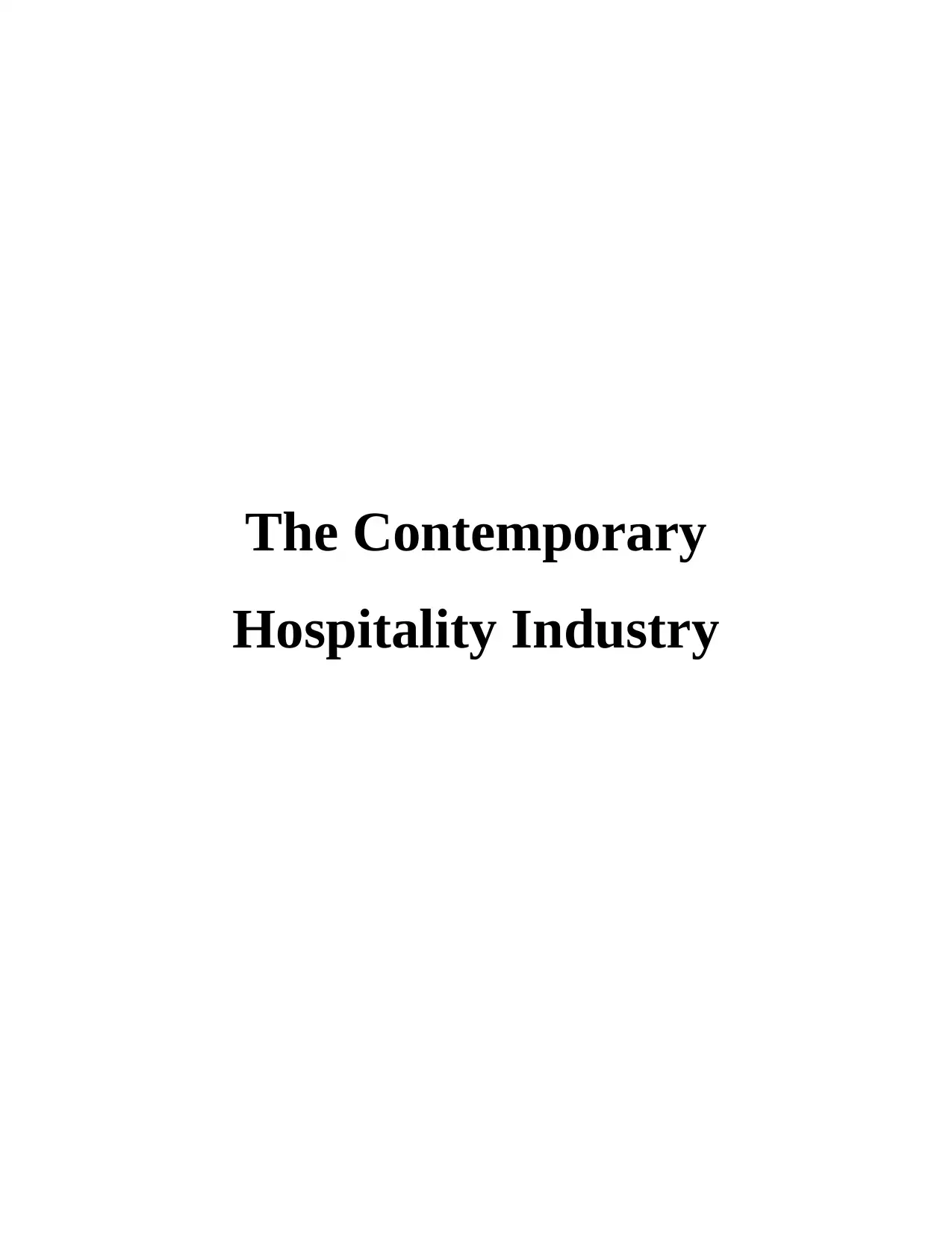
The Contemporary
Hospitality Industry
Hospitality Industry
Paraphrase This Document
Need a fresh take? Get an instant paraphrase of this document with our AI Paraphraser
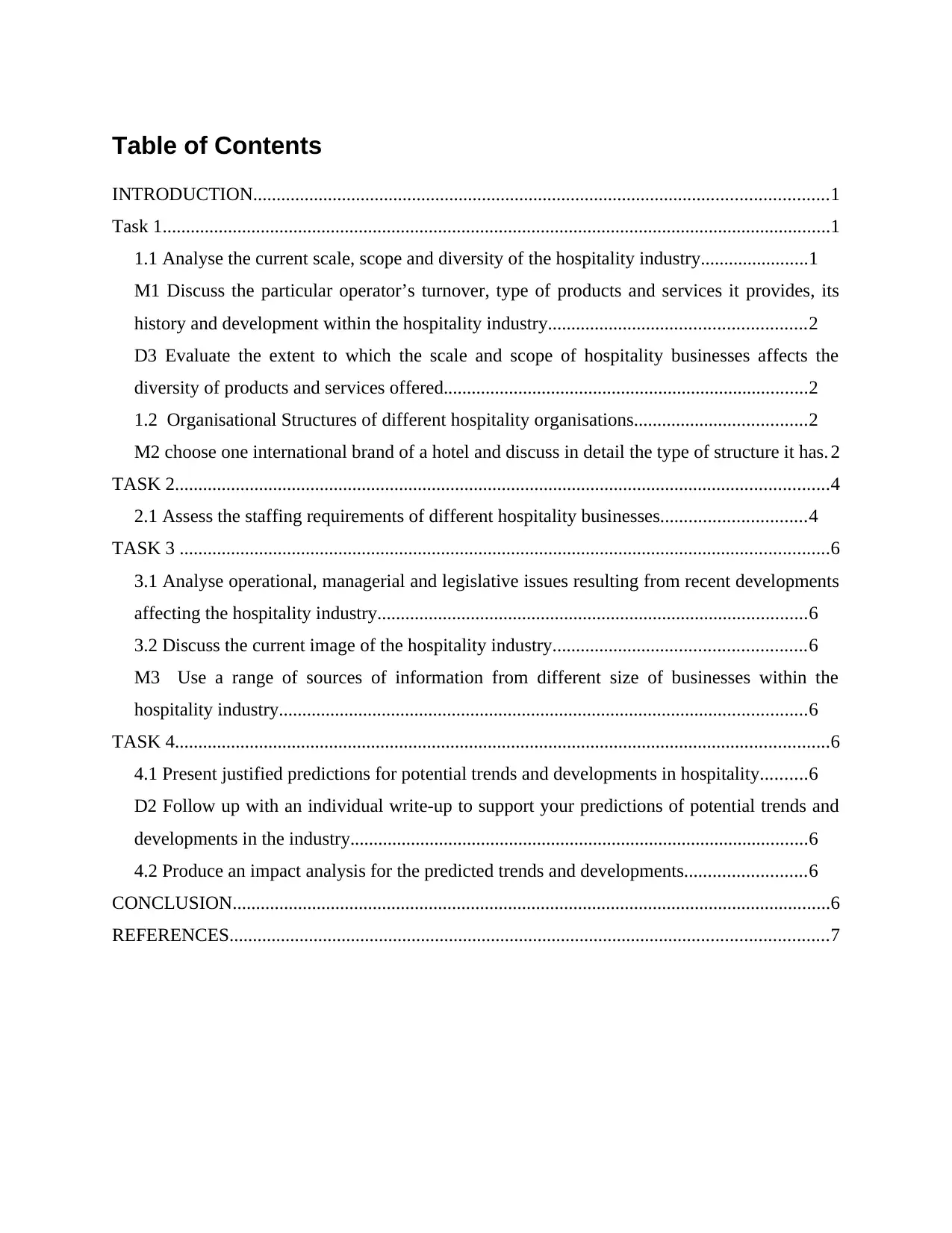
Table of Contents
INTRODUCTION...........................................................................................................................1
Task 1...............................................................................................................................................1
1.1 Analyse the current scale, scope and diversity of the hospitality industry.......................1
M1 Discuss the particular operator’s turnover, type of products and services it provides, its
history and development within the hospitality industry.......................................................2
D3 Evaluate the extent to which the scale and scope of hospitality businesses affects the
diversity of products and services offered..............................................................................2
1.2 Organisational Structures of different hospitality organisations.....................................2
M2 choose one international brand of a hotel and discuss in detail the type of structure it has. 2
TASK 2............................................................................................................................................4
2.1 Assess the staffing requirements of different hospitality businesses...............................4
TASK 3 ...........................................................................................................................................6
3.1 Analyse operational, managerial and legislative issues resulting from recent developments
affecting the hospitality industry............................................................................................6
3.2 Discuss the current image of the hospitality industry......................................................6
M3 Use a range of sources of information from different size of businesses within the
hospitality industry.................................................................................................................6
TASK 4............................................................................................................................................6
4.1 Present justified predictions for potential trends and developments in hospitality..........6
D2 Follow up with an individual write-up to support your predictions of potential trends and
developments in the industry..................................................................................................6
4.2 Produce an impact analysis for the predicted trends and developments..........................6
CONCLUSION................................................................................................................................6
REFERENCES................................................................................................................................7
INTRODUCTION...........................................................................................................................1
Task 1...............................................................................................................................................1
1.1 Analyse the current scale, scope and diversity of the hospitality industry.......................1
M1 Discuss the particular operator’s turnover, type of products and services it provides, its
history and development within the hospitality industry.......................................................2
D3 Evaluate the extent to which the scale and scope of hospitality businesses affects the
diversity of products and services offered..............................................................................2
1.2 Organisational Structures of different hospitality organisations.....................................2
M2 choose one international brand of a hotel and discuss in detail the type of structure it has. 2
TASK 2............................................................................................................................................4
2.1 Assess the staffing requirements of different hospitality businesses...............................4
TASK 3 ...........................................................................................................................................6
3.1 Analyse operational, managerial and legislative issues resulting from recent developments
affecting the hospitality industry............................................................................................6
3.2 Discuss the current image of the hospitality industry......................................................6
M3 Use a range of sources of information from different size of businesses within the
hospitality industry.................................................................................................................6
TASK 4............................................................................................................................................6
4.1 Present justified predictions for potential trends and developments in hospitality..........6
D2 Follow up with an individual write-up to support your predictions of potential trends and
developments in the industry..................................................................................................6
4.2 Produce an impact analysis for the predicted trends and developments..........................6
CONCLUSION................................................................................................................................6
REFERENCES................................................................................................................................7
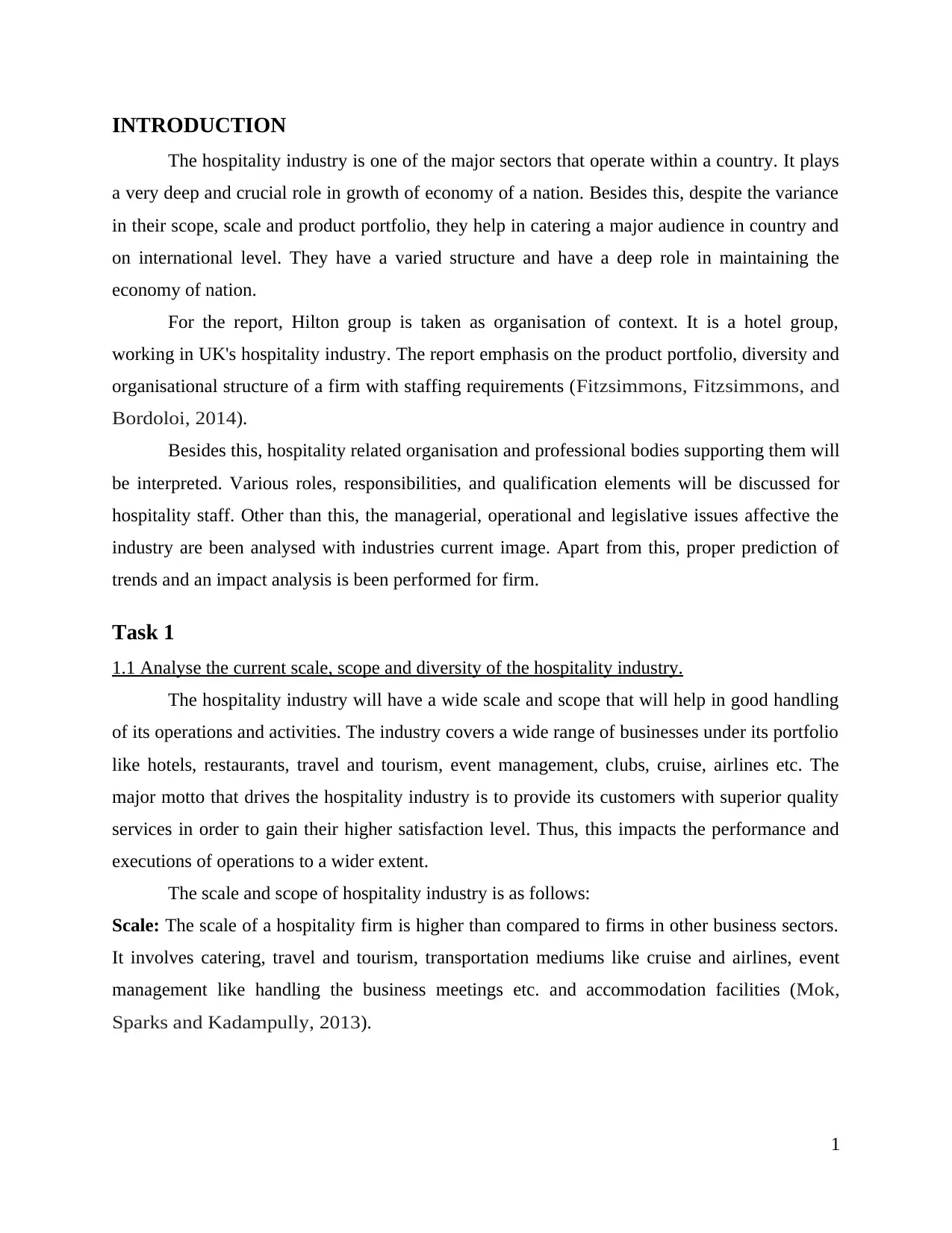
INTRODUCTION
The hospitality industry is one of the major sectors that operate within a country. It plays
a very deep and crucial role in growth of economy of a nation. Besides this, despite the variance
in their scope, scale and product portfolio, they help in catering a major audience in country and
on international level. They have a varied structure and have a deep role in maintaining the
economy of nation.
For the report, Hilton group is taken as organisation of context. It is a hotel group,
working in UK's hospitality industry. The report emphasis on the product portfolio, diversity and
organisational structure of a firm with staffing requirements ( Fitzsimmons, Fitzsimmons, and
Bordoloi, 2014).
Besides this, hospitality related organisation and professional bodies supporting them will
be interpreted. Various roles, responsibilities, and qualification elements will be discussed for
hospitality staff. Other than this, the managerial, operational and legislative issues affective the
industry are been analysed with industries current image. Apart from this, proper prediction of
trends and an impact analysis is been performed for firm.
Task 1
1.1 Analyse the current scale, scope and diversity of the hospitality industry.
The hospitality industry will have a wide scale and scope that will help in good handling
of its operations and activities. The industry covers a wide range of businesses under its portfolio
like hotels, restaurants, travel and tourism, event management, clubs, cruise, airlines etc. The
major motto that drives the hospitality industry is to provide its customers with superior quality
services in order to gain their higher satisfaction level. Thus, this impacts the performance and
executions of operations to a wider extent.
The scale and scope of hospitality industry is as follows:
Scale: The scale of a hospitality firm is higher than compared to firms in other business sectors.
It involves catering, travel and tourism, transportation mediums like cruise and airlines, event
management like handling the business meetings etc. and accommodation facilities ( Mok,
Sparks and Kadampully, 2013).
1
The hospitality industry is one of the major sectors that operate within a country. It plays
a very deep and crucial role in growth of economy of a nation. Besides this, despite the variance
in their scope, scale and product portfolio, they help in catering a major audience in country and
on international level. They have a varied structure and have a deep role in maintaining the
economy of nation.
For the report, Hilton group is taken as organisation of context. It is a hotel group,
working in UK's hospitality industry. The report emphasis on the product portfolio, diversity and
organisational structure of a firm with staffing requirements ( Fitzsimmons, Fitzsimmons, and
Bordoloi, 2014).
Besides this, hospitality related organisation and professional bodies supporting them will
be interpreted. Various roles, responsibilities, and qualification elements will be discussed for
hospitality staff. Other than this, the managerial, operational and legislative issues affective the
industry are been analysed with industries current image. Apart from this, proper prediction of
trends and an impact analysis is been performed for firm.
Task 1
1.1 Analyse the current scale, scope and diversity of the hospitality industry.
The hospitality industry will have a wide scale and scope that will help in good handling
of its operations and activities. The industry covers a wide range of businesses under its portfolio
like hotels, restaurants, travel and tourism, event management, clubs, cruise, airlines etc. The
major motto that drives the hospitality industry is to provide its customers with superior quality
services in order to gain their higher satisfaction level. Thus, this impacts the performance and
executions of operations to a wider extent.
The scale and scope of hospitality industry is as follows:
Scale: The scale of a hospitality firm is higher than compared to firms in other business sectors.
It involves catering, travel and tourism, transportation mediums like cruise and airlines, event
management like handling the business meetings etc. and accommodation facilities ( Mok,
Sparks and Kadampully, 2013).
1
⊘ This is a preview!⊘
Do you want full access?
Subscribe today to unlock all pages.

Trusted by 1+ million students worldwide
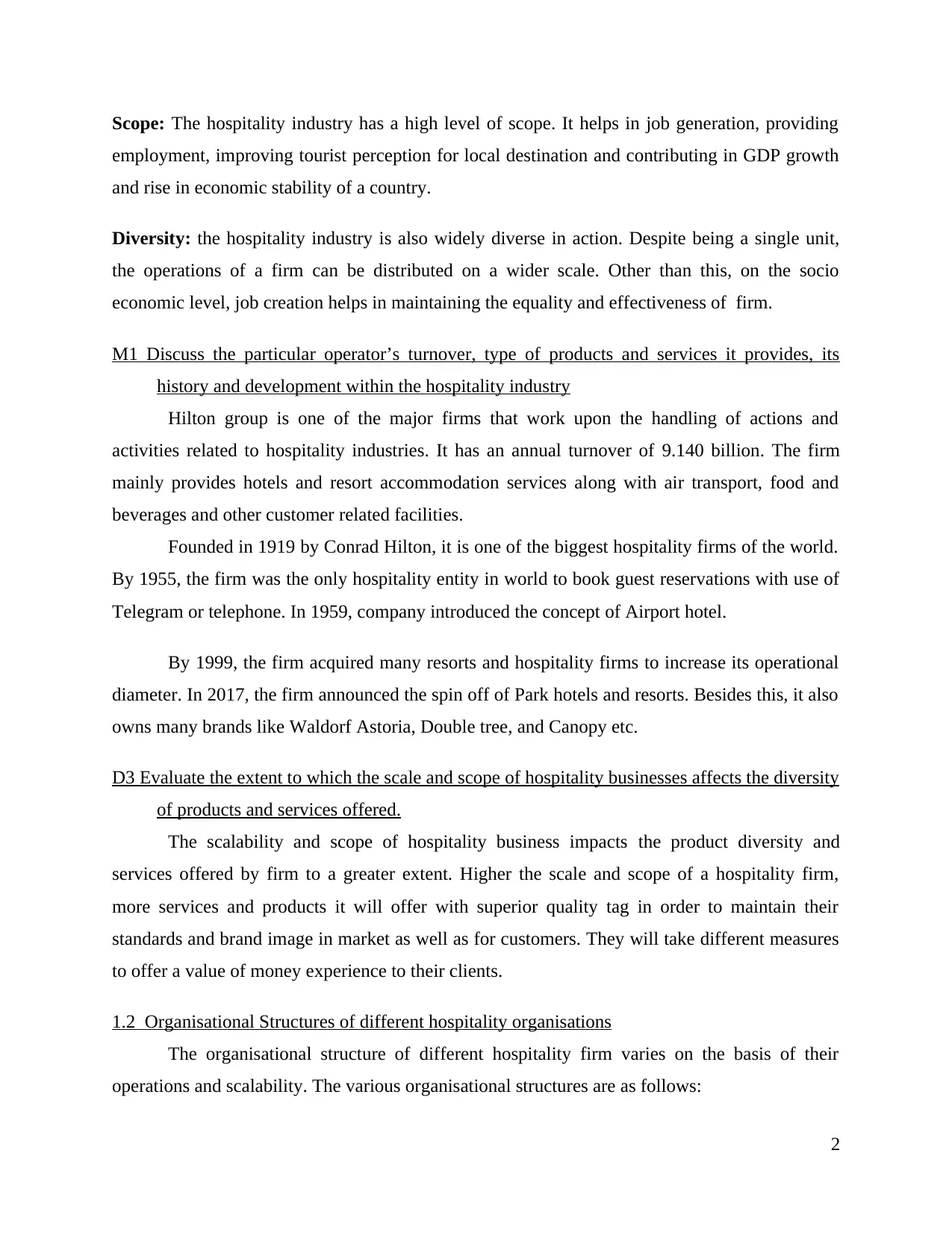
Scope: The hospitality industry has a high level of scope. It helps in job generation, providing
employment, improving tourist perception for local destination and contributing in GDP growth
and rise in economic stability of a country.
Diversity: the hospitality industry is also widely diverse in action. Despite being a single unit,
the operations of a firm can be distributed on a wider scale. Other than this, on the socio
economic level, job creation helps in maintaining the equality and effectiveness of firm.
M1 Discuss the particular operator’s turnover, type of products and services it provides, its
history and development within the hospitality industry
Hilton group is one of the major firms that work upon the handling of actions and
activities related to hospitality industries. It has an annual turnover of 9.140 billion. The firm
mainly provides hotels and resort accommodation services along with air transport, food and
beverages and other customer related facilities.
Founded in 1919 by Conrad Hilton, it is one of the biggest hospitality firms of the world.
By 1955, the firm was the only hospitality entity in world to book guest reservations with use of
Telegram or telephone. In 1959, company introduced the concept of Airport hotel.
By 1999, the firm acquired many resorts and hospitality firms to increase its operational
diameter. In 2017, the firm announced the spin off of Park hotels and resorts. Besides this, it also
owns many brands like Waldorf Astoria, Double tree, and Canopy etc.
D3 Evaluate the extent to which the scale and scope of hospitality businesses affects the diversity
of products and services offered.
The scalability and scope of hospitality business impacts the product diversity and
services offered by firm to a greater extent. Higher the scale and scope of a hospitality firm,
more services and products it will offer with superior quality tag in order to maintain their
standards and brand image in market as well as for customers. They will take different measures
to offer a value of money experience to their clients.
1.2 Organisational Structures of different hospitality organisations
The organisational structure of different hospitality firm varies on the basis of their
operations and scalability. The various organisational structures are as follows:
2
employment, improving tourist perception for local destination and contributing in GDP growth
and rise in economic stability of a country.
Diversity: the hospitality industry is also widely diverse in action. Despite being a single unit,
the operations of a firm can be distributed on a wider scale. Other than this, on the socio
economic level, job creation helps in maintaining the equality and effectiveness of firm.
M1 Discuss the particular operator’s turnover, type of products and services it provides, its
history and development within the hospitality industry
Hilton group is one of the major firms that work upon the handling of actions and
activities related to hospitality industries. It has an annual turnover of 9.140 billion. The firm
mainly provides hotels and resort accommodation services along with air transport, food and
beverages and other customer related facilities.
Founded in 1919 by Conrad Hilton, it is one of the biggest hospitality firms of the world.
By 1955, the firm was the only hospitality entity in world to book guest reservations with use of
Telegram or telephone. In 1959, company introduced the concept of Airport hotel.
By 1999, the firm acquired many resorts and hospitality firms to increase its operational
diameter. In 2017, the firm announced the spin off of Park hotels and resorts. Besides this, it also
owns many brands like Waldorf Astoria, Double tree, and Canopy etc.
D3 Evaluate the extent to which the scale and scope of hospitality businesses affects the diversity
of products and services offered.
The scalability and scope of hospitality business impacts the product diversity and
services offered by firm to a greater extent. Higher the scale and scope of a hospitality firm,
more services and products it will offer with superior quality tag in order to maintain their
standards and brand image in market as well as for customers. They will take different measures
to offer a value of money experience to their clients.
1.2 Organisational Structures of different hospitality organisations
The organisational structure of different hospitality firm varies on the basis of their
operations and scalability. The various organisational structures are as follows:
2
Paraphrase This Document
Need a fresh take? Get an instant paraphrase of this document with our AI Paraphraser
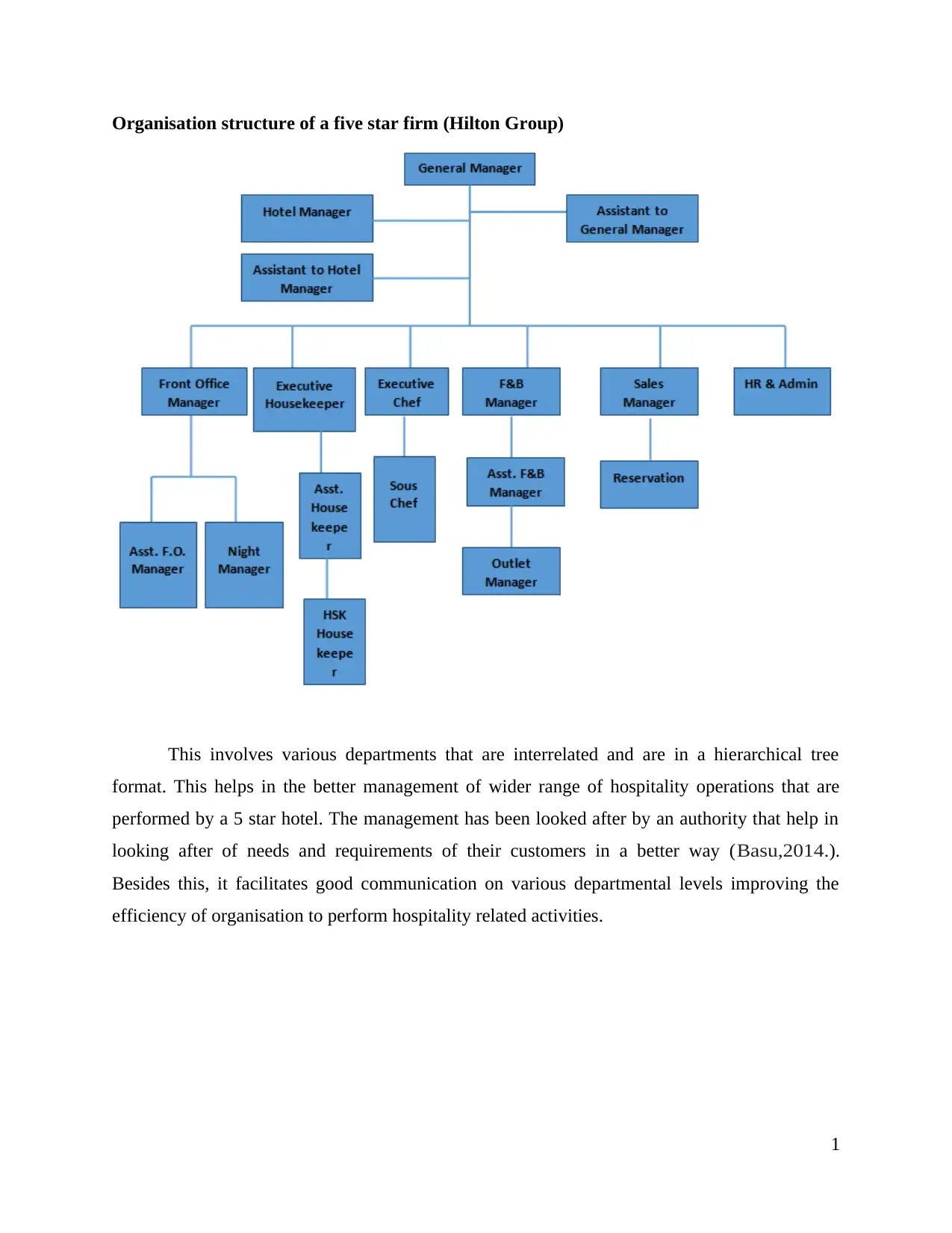
Organisation structure of a five star firm (Hilton Group)
This involves various departments that are interrelated and are in a hierarchical tree
format. This helps in the better management of wider range of hospitality operations that are
performed by a 5 star hotel. The management has been looked after by an authority that help in
looking after of needs and requirements of their customers in a better way ( Basu,2014.).
Besides this, it facilitates good communication on various departmental levels improving the
efficiency of organisation to perform hospitality related activities.
1
This involves various departments that are interrelated and are in a hierarchical tree
format. This helps in the better management of wider range of hospitality operations that are
performed by a 5 star hotel. The management has been looked after by an authority that help in
looking after of needs and requirements of their customers in a better way ( Basu,2014.).
Besides this, it facilitates good communication on various departmental levels improving the
efficiency of organisation to perform hospitality related activities.
1
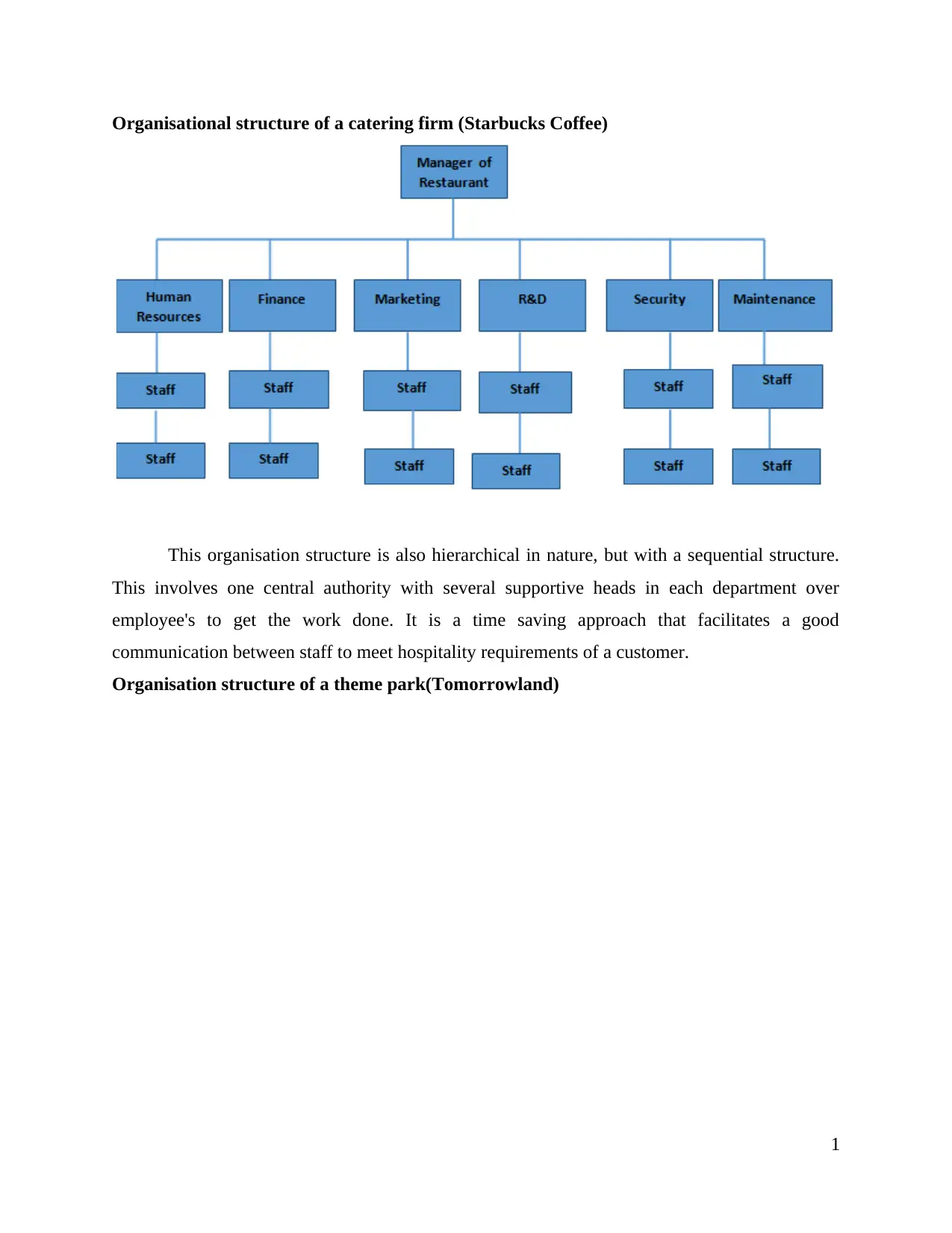
Organisational structure of a catering firm (Starbucks Coffee)
This organisation structure is also hierarchical in nature, but with a sequential structure.
This involves one central authority with several supportive heads in each department over
employee's to get the work done. It is a time saving approach that facilitates a good
communication between staff to meet hospitality requirements of a customer.
Organisation structure of a theme park(Tomorrowland)
1
This organisation structure is also hierarchical in nature, but with a sequential structure.
This involves one central authority with several supportive heads in each department over
employee's to get the work done. It is a time saving approach that facilitates a good
communication between staff to meet hospitality requirements of a customer.
Organisation structure of a theme park(Tomorrowland)
1
⊘ This is a preview!⊘
Do you want full access?
Subscribe today to unlock all pages.

Trusted by 1+ million students worldwide
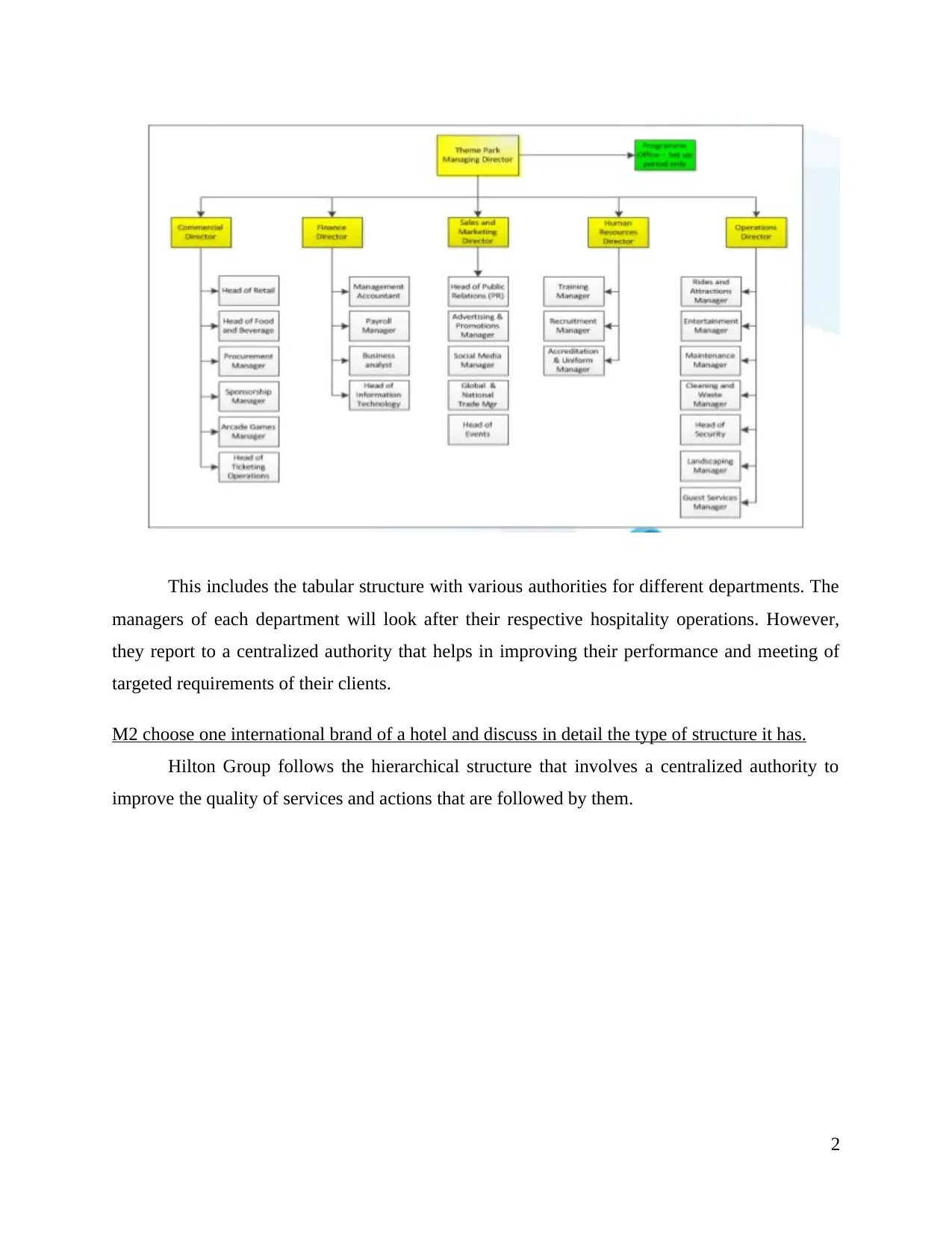
This includes the tabular structure with various authorities for different departments. The
managers of each department will look after their respective hospitality operations. However,
they report to a centralized authority that helps in improving their performance and meeting of
targeted requirements of their clients.
M2 choose one international brand of a hotel and discuss in detail the type of structure it has.
Hilton Group follows the hierarchical structure that involves a centralized authority to
improve the quality of services and actions that are followed by them.
2
managers of each department will look after their respective hospitality operations. However,
they report to a centralized authority that helps in improving their performance and meeting of
targeted requirements of their clients.
M2 choose one international brand of a hotel and discuss in detail the type of structure it has.
Hilton Group follows the hierarchical structure that involves a centralized authority to
improve the quality of services and actions that are followed by them.
2
Paraphrase This Document
Need a fresh take? Get an instant paraphrase of this document with our AI Paraphraser
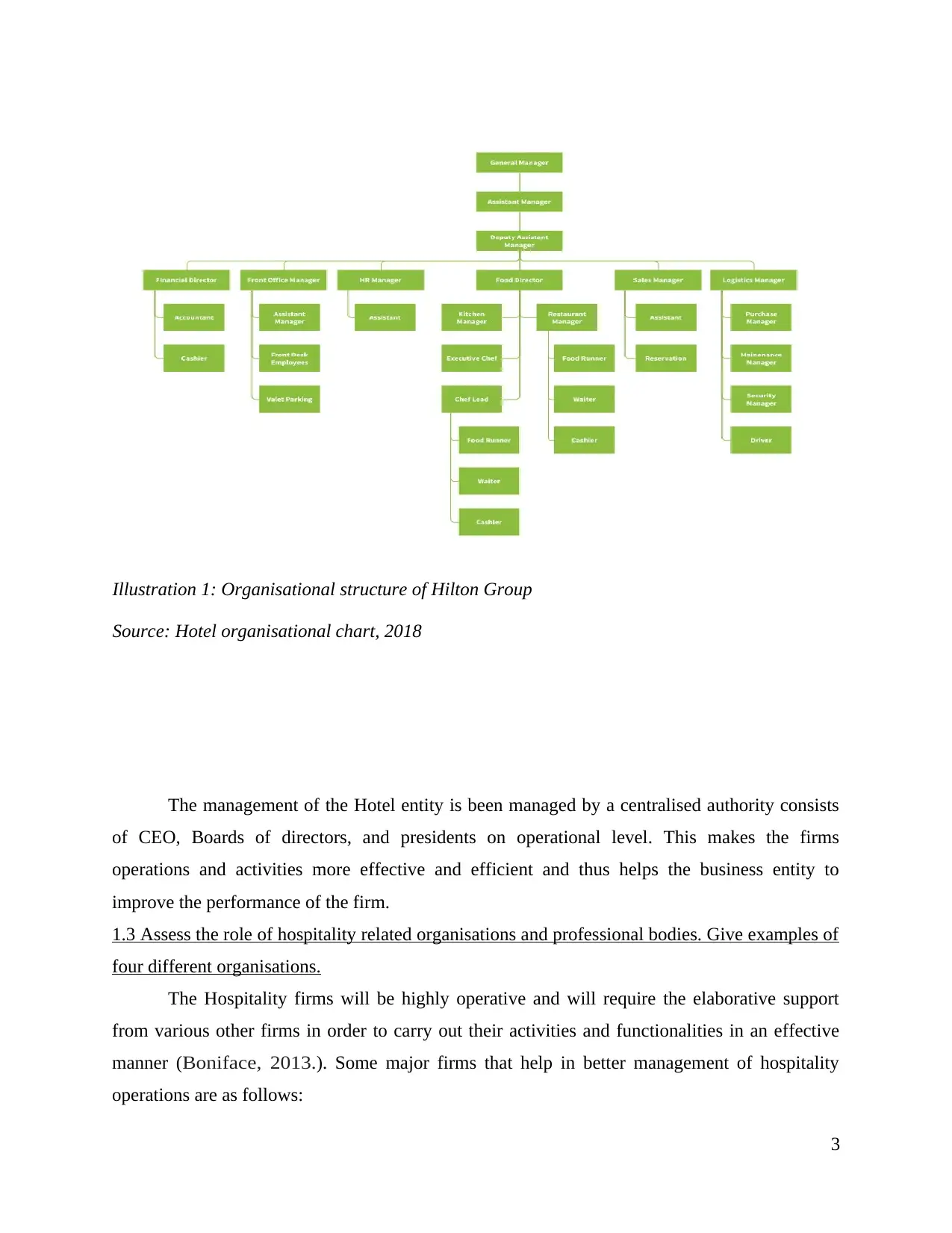
The management of the Hotel entity is been managed by a centralised authority consists
of CEO, Boards of directors, and presidents on operational level. This makes the firms
operations and activities more effective and efficient and thus helps the business entity to
improve the performance of the firm.
1.3 Assess the role of hospitality related organisations and professional bodies. Give examples of
four different organisations.
The Hospitality firms will be highly operative and will require the elaborative support
from various other firms in order to carry out their activities and functionalities in an effective
manner ( Boniface, 2013.). Some major firms that help in better management of hospitality
operations are as follows:
3
Illustration 1: Organisational structure of Hilton Group
Source: Hotel organisational chart, 2018
of CEO, Boards of directors, and presidents on operational level. This makes the firms
operations and activities more effective and efficient and thus helps the business entity to
improve the performance of the firm.
1.3 Assess the role of hospitality related organisations and professional bodies. Give examples of
four different organisations.
The Hospitality firms will be highly operative and will require the elaborative support
from various other firms in order to carry out their activities and functionalities in an effective
manner ( Boniface, 2013.). Some major firms that help in better management of hospitality
operations are as follows:
3
Illustration 1: Organisational structure of Hilton Group
Source: Hotel organisational chart, 2018
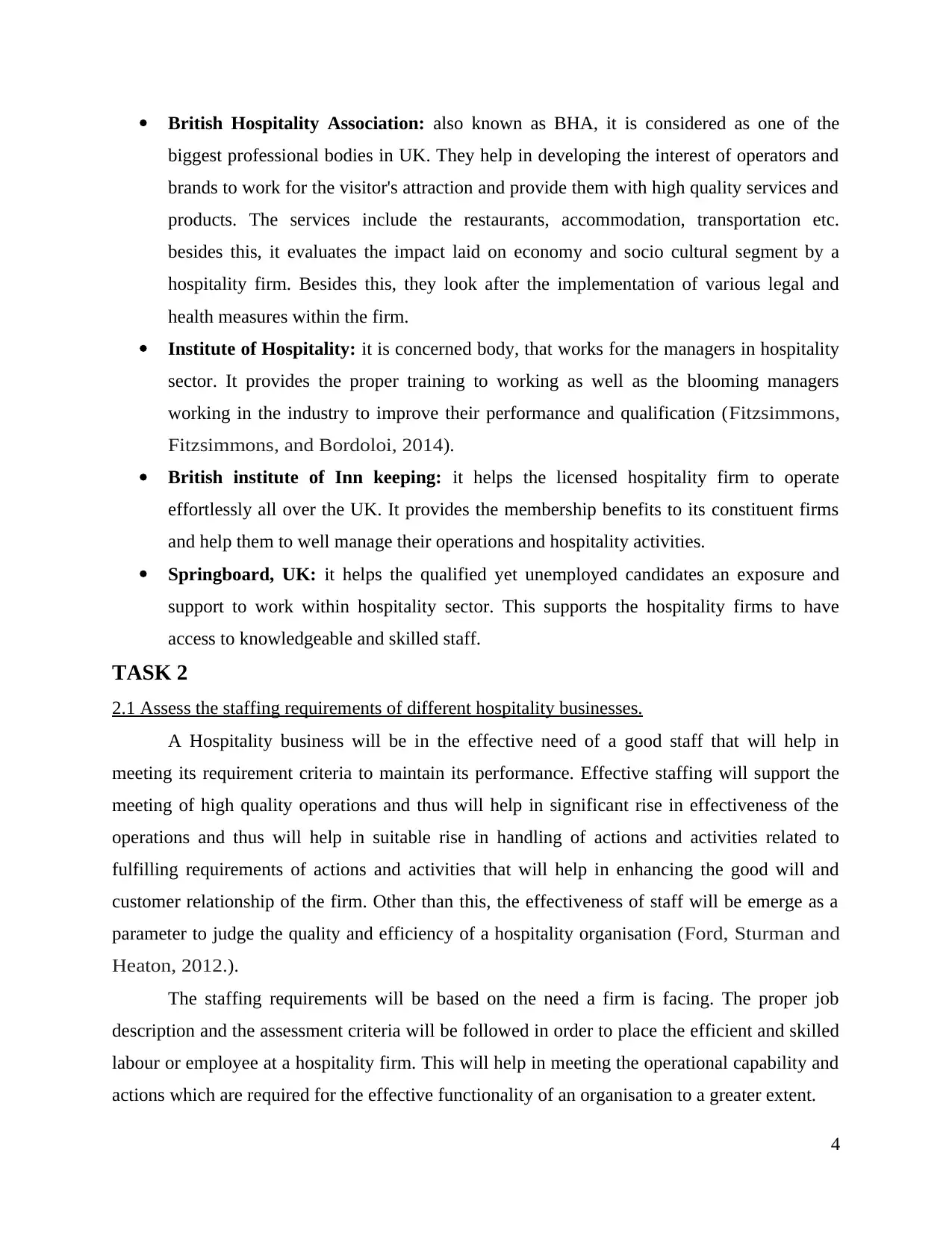
British Hospitality Association: also known as BHA, it is considered as one of the
biggest professional bodies in UK. They help in developing the interest of operators and
brands to work for the visitor's attraction and provide them with high quality services and
products. The services include the restaurants, accommodation, transportation etc.
besides this, it evaluates the impact laid on economy and socio cultural segment by a
hospitality firm. Besides this, they look after the implementation of various legal and
health measures within the firm.
Institute of Hospitality: it is concerned body, that works for the managers in hospitality
sector. It provides the proper training to working as well as the blooming managers
working in the industry to improve their performance and qualification ( Fitzsimmons,
Fitzsimmons, and Bordoloi, 2014).
British institute of Inn keeping: it helps the licensed hospitality firm to operate
effortlessly all over the UK. It provides the membership benefits to its constituent firms
and help them to well manage their operations and hospitality activities.
Springboard, UK: it helps the qualified yet unemployed candidates an exposure and
support to work within hospitality sector. This supports the hospitality firms to have
access to knowledgeable and skilled staff.
TASK 2
2.1 Assess the staffing requirements of different hospitality businesses.
A Hospitality business will be in the effective need of a good staff that will help in
meeting its requirement criteria to maintain its performance. Effective staffing will support the
meeting of high quality operations and thus will help in significant rise in effectiveness of the
operations and thus will help in suitable rise in handling of actions and activities related to
fulfilling requirements of actions and activities that will help in enhancing the good will and
customer relationship of the firm. Other than this, the effectiveness of staff will be emerge as a
parameter to judge the quality and efficiency of a hospitality organisation ( Ford, Sturman and
Heaton, 2012.).
The staffing requirements will be based on the need a firm is facing. The proper job
description and the assessment criteria will be followed in order to place the efficient and skilled
labour or employee at a hospitality firm. This will help in meeting the operational capability and
actions which are required for the effective functionality of an organisation to a greater extent.
4
biggest professional bodies in UK. They help in developing the interest of operators and
brands to work for the visitor's attraction and provide them with high quality services and
products. The services include the restaurants, accommodation, transportation etc.
besides this, it evaluates the impact laid on economy and socio cultural segment by a
hospitality firm. Besides this, they look after the implementation of various legal and
health measures within the firm.
Institute of Hospitality: it is concerned body, that works for the managers in hospitality
sector. It provides the proper training to working as well as the blooming managers
working in the industry to improve their performance and qualification ( Fitzsimmons,
Fitzsimmons, and Bordoloi, 2014).
British institute of Inn keeping: it helps the licensed hospitality firm to operate
effortlessly all over the UK. It provides the membership benefits to its constituent firms
and help them to well manage their operations and hospitality activities.
Springboard, UK: it helps the qualified yet unemployed candidates an exposure and
support to work within hospitality sector. This supports the hospitality firms to have
access to knowledgeable and skilled staff.
TASK 2
2.1 Assess the staffing requirements of different hospitality businesses.
A Hospitality business will be in the effective need of a good staff that will help in
meeting its requirement criteria to maintain its performance. Effective staffing will support the
meeting of high quality operations and thus will help in significant rise in effectiveness of the
operations and thus will help in suitable rise in handling of actions and activities related to
fulfilling requirements of actions and activities that will help in enhancing the good will and
customer relationship of the firm. Other than this, the effectiveness of staff will be emerge as a
parameter to judge the quality and efficiency of a hospitality organisation ( Ford, Sturman and
Heaton, 2012.).
The staffing requirements will be based on the need a firm is facing. The proper job
description and the assessment criteria will be followed in order to place the efficient and skilled
labour or employee at a hospitality firm. This will help in meeting the operational capability and
actions which are required for the effective functionality of an organisation to a greater extent.
4
⊘ This is a preview!⊘
Do you want full access?
Subscribe today to unlock all pages.

Trusted by 1+ million students worldwide
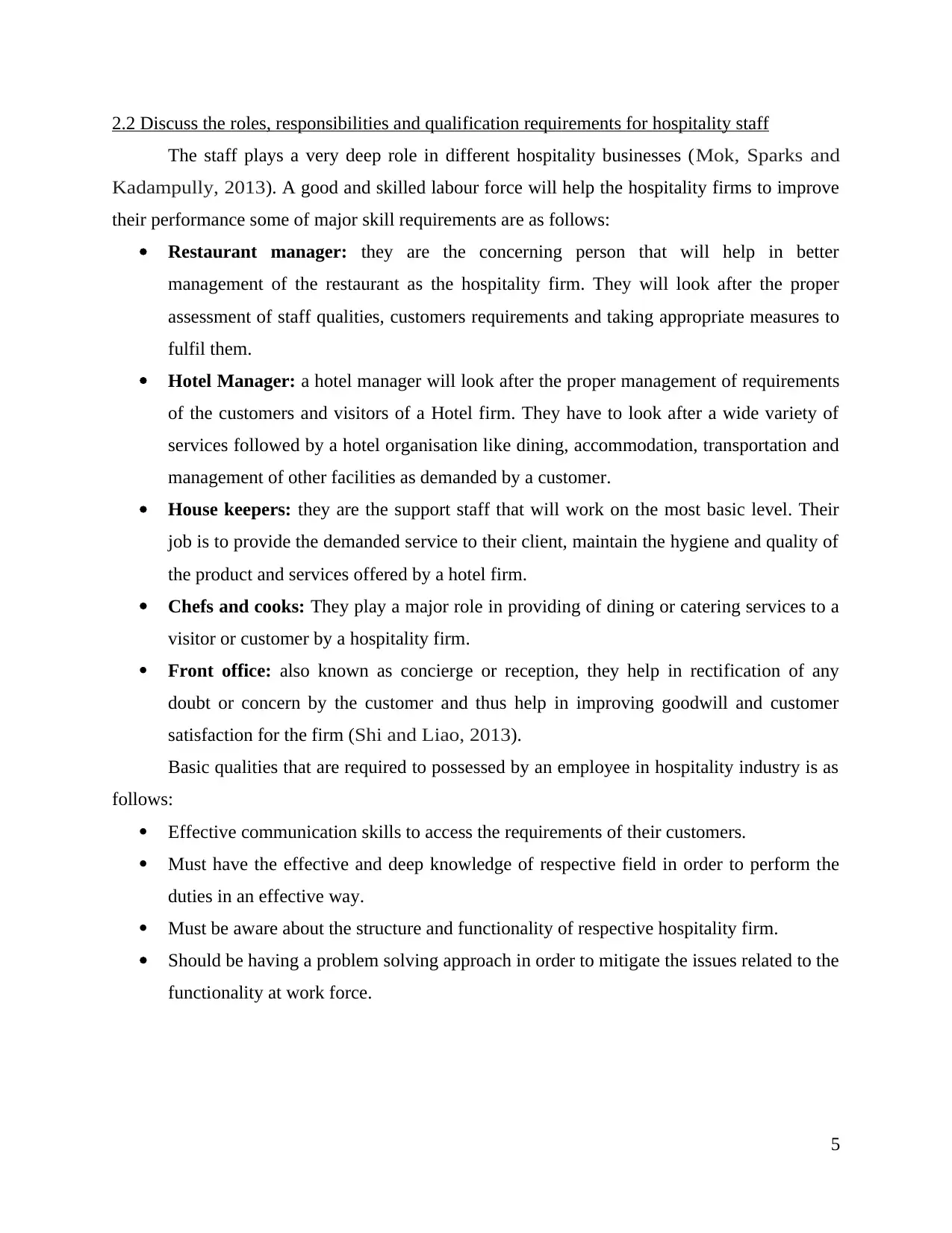
2.2 Discuss the roles, responsibilities and qualification requirements for hospitality staff
The staff plays a very deep role in different hospitality businesses ( Mok, Sparks and
Kadampully, 2013). A good and skilled labour force will help the hospitality firms to improve
their performance some of major skill requirements are as follows:
Restaurant manager: they are the concerning person that will help in better
management of the restaurant as the hospitality firm. They will look after the proper
assessment of staff qualities, customers requirements and taking appropriate measures to
fulfil them.
Hotel Manager: a hotel manager will look after the proper management of requirements
of the customers and visitors of a Hotel firm. They have to look after a wide variety of
services followed by a hotel organisation like dining, accommodation, transportation and
management of other facilities as demanded by a customer.
House keepers: they are the support staff that will work on the most basic level. Their
job is to provide the demanded service to their client, maintain the hygiene and quality of
the product and services offered by a hotel firm.
Chefs and cooks: They play a major role in providing of dining or catering services to a
visitor or customer by a hospitality firm.
Front office: also known as concierge or reception, they help in rectification of any
doubt or concern by the customer and thus help in improving goodwill and customer
satisfaction for the firm ( Shi and Liao, 2013).
Basic qualities that are required to possessed by an employee in hospitality industry is as
follows:
Effective communication skills to access the requirements of their customers.
Must have the effective and deep knowledge of respective field in order to perform the
duties in an effective way.
Must be aware about the structure and functionality of respective hospitality firm.
Should be having a problem solving approach in order to mitigate the issues related to the
functionality at work force.
5
The staff plays a very deep role in different hospitality businesses ( Mok, Sparks and
Kadampully, 2013). A good and skilled labour force will help the hospitality firms to improve
their performance some of major skill requirements are as follows:
Restaurant manager: they are the concerning person that will help in better
management of the restaurant as the hospitality firm. They will look after the proper
assessment of staff qualities, customers requirements and taking appropriate measures to
fulfil them.
Hotel Manager: a hotel manager will look after the proper management of requirements
of the customers and visitors of a Hotel firm. They have to look after a wide variety of
services followed by a hotel organisation like dining, accommodation, transportation and
management of other facilities as demanded by a customer.
House keepers: they are the support staff that will work on the most basic level. Their
job is to provide the demanded service to their client, maintain the hygiene and quality of
the product and services offered by a hotel firm.
Chefs and cooks: They play a major role in providing of dining or catering services to a
visitor or customer by a hospitality firm.
Front office: also known as concierge or reception, they help in rectification of any
doubt or concern by the customer and thus help in improving goodwill and customer
satisfaction for the firm ( Shi and Liao, 2013).
Basic qualities that are required to possessed by an employee in hospitality industry is as
follows:
Effective communication skills to access the requirements of their customers.
Must have the effective and deep knowledge of respective field in order to perform the
duties in an effective way.
Must be aware about the structure and functionality of respective hospitality firm.
Should be having a problem solving approach in order to mitigate the issues related to the
functionality at work force.
5
Paraphrase This Document
Need a fresh take? Get an instant paraphrase of this document with our AI Paraphraser
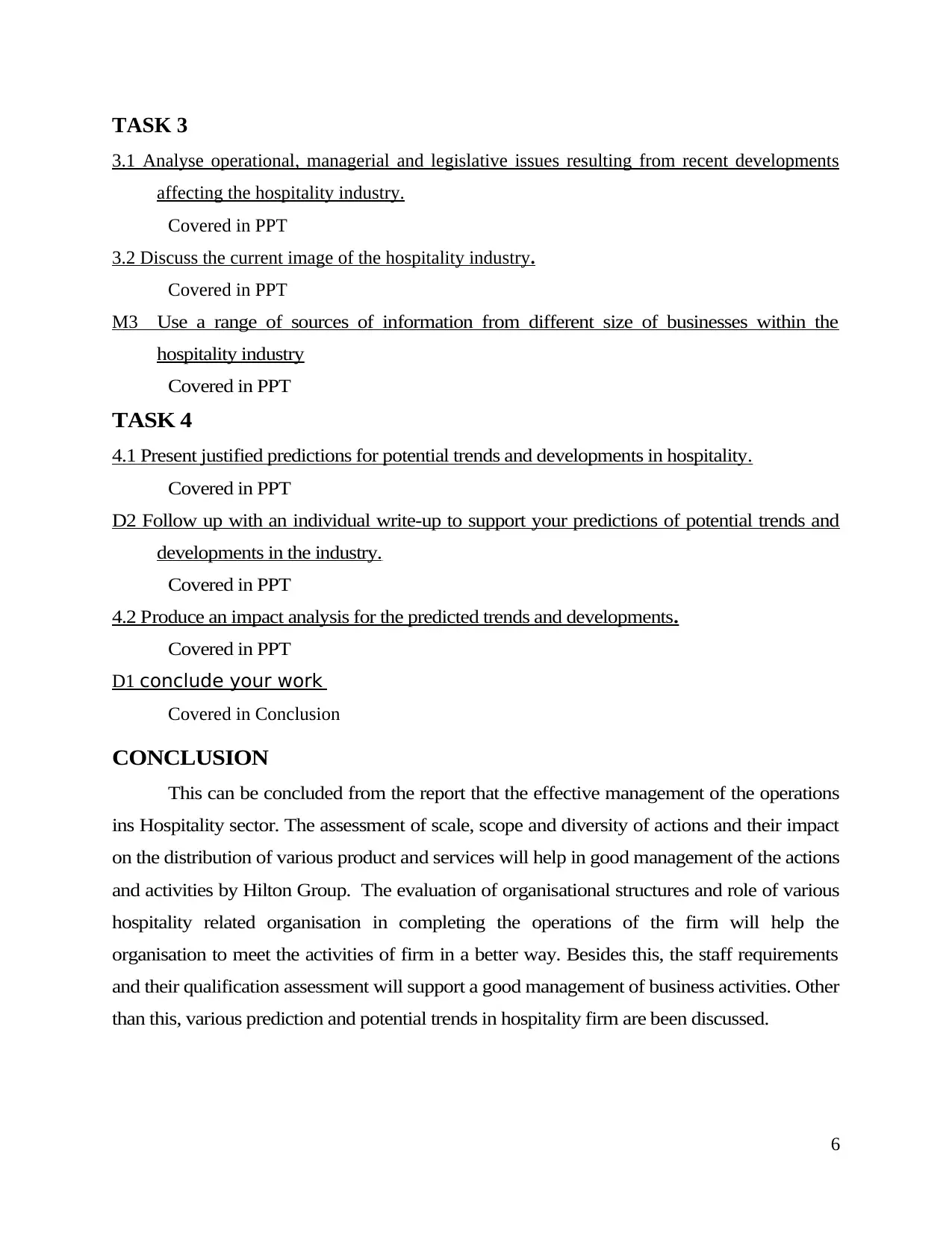
TASK 3
3.1 Analyse operational, managerial and legislative issues resulting from recent developments
affecting the hospitality industry.
Covered in PPT
3.2 Discuss the current image of the hospitality industry.
Covered in PPT
M3 Use a range of sources of information from different size of businesses within the
hospitality industry
Covered in PPT
TASK 4
4.1 Present justified predictions for potential trends and developments in hospitality.
Covered in PPT
D2 Follow up with an individual write-up to support your predictions of potential trends and
developments in the industry.
Covered in PPT
4.2 Produce an impact analysis for the predicted trends and developments.
Covered in PPT
D1 conclude your work
Covered in Conclusion
CONCLUSION
This can be concluded from the report that the effective management of the operations
ins Hospitality sector. The assessment of scale, scope and diversity of actions and their impact
on the distribution of various product and services will help in good management of the actions
and activities by Hilton Group. The evaluation of organisational structures and role of various
hospitality related organisation in completing the operations of the firm will help the
organisation to meet the activities of firm in a better way. Besides this, the staff requirements
and their qualification assessment will support a good management of business activities. Other
than this, various prediction and potential trends in hospitality firm are been discussed.
6
3.1 Analyse operational, managerial and legislative issues resulting from recent developments
affecting the hospitality industry.
Covered in PPT
3.2 Discuss the current image of the hospitality industry.
Covered in PPT
M3 Use a range of sources of information from different size of businesses within the
hospitality industry
Covered in PPT
TASK 4
4.1 Present justified predictions for potential trends and developments in hospitality.
Covered in PPT
D2 Follow up with an individual write-up to support your predictions of potential trends and
developments in the industry.
Covered in PPT
4.2 Produce an impact analysis for the predicted trends and developments.
Covered in PPT
D1 conclude your work
Covered in Conclusion
CONCLUSION
This can be concluded from the report that the effective management of the operations
ins Hospitality sector. The assessment of scale, scope and diversity of actions and their impact
on the distribution of various product and services will help in good management of the actions
and activities by Hilton Group. The evaluation of organisational structures and role of various
hospitality related organisation in completing the operations of the firm will help the
organisation to meet the activities of firm in a better way. Besides this, the staff requirements
and their qualification assessment will support a good management of business activities. Other
than this, various prediction and potential trends in hospitality firm are been discussed.
6
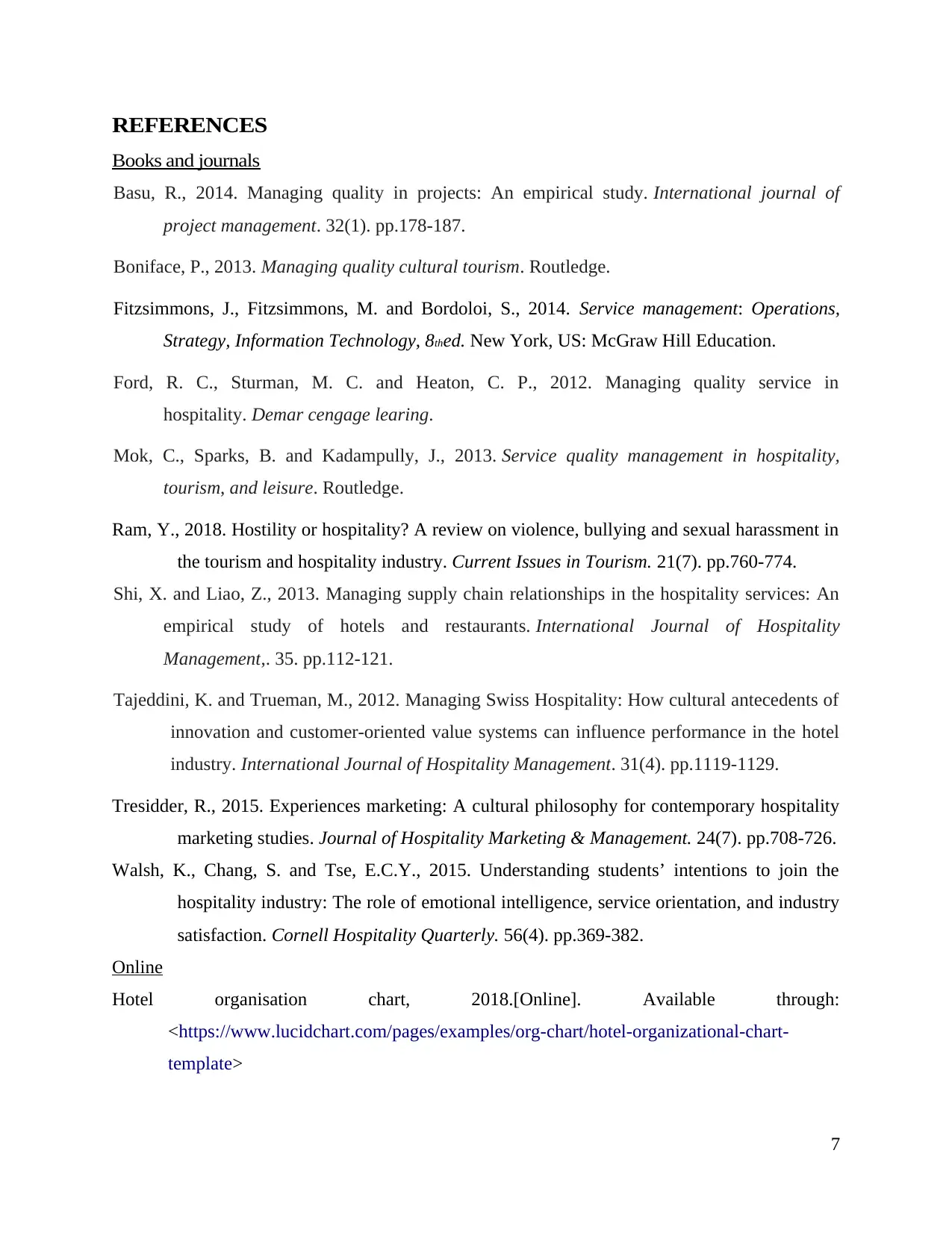
REFERENCES
Books and journals
Basu, R., 2014. Managing quality in projects: An empirical study. International journal of
project management. 32(1). pp.178-187.
Boniface, P., 2013. Managing quality cultural tourism. Routledge.
Fitzsimmons, J., Fitzsimmons, M. and Bordoloi, S., 2014. Service management: Operations,
Strategy, Information Technology, 8thed. New York, US: McGraw Hill Education.
Ford, R. C., Sturman, M. C. and Heaton, C. P., 2012. Managing quality service in
hospitality. Demar cengage learing.
Mok, C., Sparks, B. and Kadampully, J., 2013. Service quality management in hospitality,
tourism, and leisure. Routledge.
Ram, Y., 2018. Hostility or hospitality? A review on violence, bullying and sexual harassment in
the tourism and hospitality industry. Current Issues in Tourism. 21(7). pp.760-774.
Shi, X. and Liao, Z., 2013. Managing supply chain relationships in the hospitality services: An
empirical study of hotels and restaurants. International Journal of Hospitality
Management,. 35. pp.112-121.
Tajeddini, K. and Trueman, M., 2012. Managing Swiss Hospitality: How cultural antecedents of
innovation and customer-oriented value systems can influence performance in the hotel
industry. International Journal of Hospitality Management. 31(4). pp.1119-1129.
Tresidder, R., 2015. Experiences marketing: A cultural philosophy for contemporary hospitality
marketing studies. Journal of Hospitality Marketing & Management. 24(7). pp.708-726.
Walsh, K., Chang, S. and Tse, E.C.Y., 2015. Understanding students’ intentions to join the
hospitality industry: The role of emotional intelligence, service orientation, and industry
satisfaction. Cornell Hospitality Quarterly. 56(4). pp.369-382.
Online
Hotel organisation chart, 2018.[Online]. Available through:
<https://www.lucidchart.com/pages/examples/org-chart/hotel-organizational-chart-
template>
7
Books and journals
Basu, R., 2014. Managing quality in projects: An empirical study. International journal of
project management. 32(1). pp.178-187.
Boniface, P., 2013. Managing quality cultural tourism. Routledge.
Fitzsimmons, J., Fitzsimmons, M. and Bordoloi, S., 2014. Service management: Operations,
Strategy, Information Technology, 8thed. New York, US: McGraw Hill Education.
Ford, R. C., Sturman, M. C. and Heaton, C. P., 2012. Managing quality service in
hospitality. Demar cengage learing.
Mok, C., Sparks, B. and Kadampully, J., 2013. Service quality management in hospitality,
tourism, and leisure. Routledge.
Ram, Y., 2018. Hostility or hospitality? A review on violence, bullying and sexual harassment in
the tourism and hospitality industry. Current Issues in Tourism. 21(7). pp.760-774.
Shi, X. and Liao, Z., 2013. Managing supply chain relationships in the hospitality services: An
empirical study of hotels and restaurants. International Journal of Hospitality
Management,. 35. pp.112-121.
Tajeddini, K. and Trueman, M., 2012. Managing Swiss Hospitality: How cultural antecedents of
innovation and customer-oriented value systems can influence performance in the hotel
industry. International Journal of Hospitality Management. 31(4). pp.1119-1129.
Tresidder, R., 2015. Experiences marketing: A cultural philosophy for contemporary hospitality
marketing studies. Journal of Hospitality Marketing & Management. 24(7). pp.708-726.
Walsh, K., Chang, S. and Tse, E.C.Y., 2015. Understanding students’ intentions to join the
hospitality industry: The role of emotional intelligence, service orientation, and industry
satisfaction. Cornell Hospitality Quarterly. 56(4). pp.369-382.
Online
Hotel organisation chart, 2018.[Online]. Available through:
<https://www.lucidchart.com/pages/examples/org-chart/hotel-organizational-chart-
template>
7
⊘ This is a preview!⊘
Do you want full access?
Subscribe today to unlock all pages.

Trusted by 1+ million students worldwide
1 out of 12
Related Documents
Your All-in-One AI-Powered Toolkit for Academic Success.
+13062052269
info@desklib.com
Available 24*7 on WhatsApp / Email
![[object Object]](/_next/static/media/star-bottom.7253800d.svg)
Unlock your academic potential
Copyright © 2020–2025 A2Z Services. All Rights Reserved. Developed and managed by ZUCOL.





